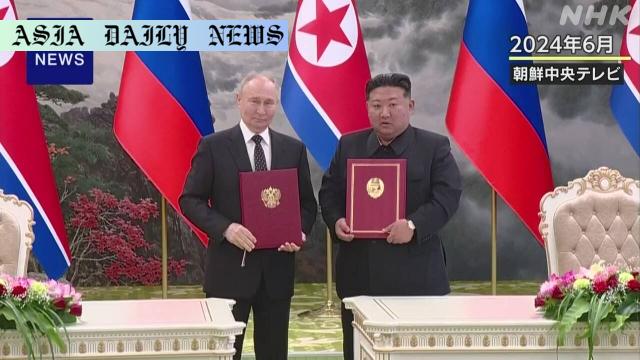Drones are expected to be co-developed by North Korea and Russia this year under an agreement that strengthens military ties.
- North Korea and Russia to co-develop multiple drone types, boosting their military ties.
- The partnership involves technology transfers in exchange for North Korean soldier deployment.
- Russia remains hesitant on aiding North Korea’s nuclear weapon development.
- Kim Jong Un previously emphasized mass production of ‘suicide drones’.

Introduction
In the latest development regarding North Korea-Russia relations, multiple sources have revealed that Pyongyang is set to begin producing drones co-developed with Moscow. This collaboration highlights strengthened military ties between the two nations as they navigate mounting global tensions and regional conflicts. The strategic partnership, rooted in technology sharing and military exchanges, emphasizes the geopolitical complexities each nation faces and aims to address.
Details of the Drone Partnership
The deal, reportedly finalized last year, involves Russia providing North Korea with advanced technical support for the development of multiple types of drones. These drones are anticipated to meet Pyongyang’s military demands and will be mass-manufactured within North Korea this year. This venture is viewed as a cornerstone in the expanding military alliance between these nations.
In exchange, North Korea appears to have agreed to deploy soldiers to assist Russia in its ongoing invasion of Ukraine. This sheds light on the mutual benefit that underpins the collaboration, with Pyongyang leveraging its manpower in exchange for advanced technology.
Moscow’s Strategic Hesitations
While the drone partnership indicates robust collaboration, sources confirmed that Russia is hesitant to provide support for North Korea’s nuclear ambitions. Moscow appears wary of the potential diplomatic fallout, particularly concerning its relations with the United States, China, and other regional players. This cautious approach demonstrates Russia’s desire to maintain a degree of balance in its international dealings.
Kim Jong Un’s Priorities
North Korean leader Kim Jong Un has consistently pushed for modernizing his nation’s military arsenal. In November 2024, he conducted an inspection of new weaponry, including a performance test for a so-called suicide drone. His emphasis on the mass production of such drones further underlines North Korea’s commitment to advancing its military capabilities through partnerships and technology-sharing agreements.
Geopolitical Implications
This alignment between North Korea and Russia presents a significant geopolitical challenge. Both nations, already under scrutiny for separate reasons, now face concerns over the implications of their collaboration. For North Korea, this could further isolate the regime, while for Russia, it adds another layer of complexity to its strained international relations due to the Ukraine conflict.
The potential mass production of these drones raises questions about their broader use, including regional threats and potential exports to other actors. Moreover, the hesitance on nuclear collaboration reflects an understanding of the sensitivity surrounding global nuclear proliferation, particularly in Asia.
Conclusion
The North Korea-Russia drone collaboration exemplifies the shifting dynamics of modern geopolitical relations. While it allows both nations to assert themselves militarily, it also adds to the broader complexities and regional instabilities. Moving forward, international stakeholders should closely monitor this development to assess its global repercussions and strategize responses to safeguard regional stability.



Commentary
Historical Perspective
It is fascinating to see the evolving dynamics between North Korea and Russia, two nations historically characterized by fluctuating levels of cooperation. The recent news of their potential collaboration on drone technology signals a notable shift in these relations, cementing a deeper and more strategic bond. Such partnerships are not merely technical or economic but reflect a broader alignment against shared adversaries and pressures.
Implications for the Global Stage
This development sheds light on the increasingly multipolar nature of the global stage. As the United States and its allies attempt to counter Russia’s aggression in Ukraine and North Korea’s military aspirations, these two nations seem intent on fortifying their positions through mutual cooperation. Drones, as a key technological asset in modern warfare, represent a tangible symbol of alliance in overcoming resource and capability gaps that otherwise hinder their strategies.
Concerns and Ethical Dimensions
On a more critical note, the ethical and security concerns arising from this partnership are significant. What does the international community do when two already-complicated entities join forces for advanced technology with potential hostile uses? North Korea’s history of prioritizing military advancements over humanitarian needs makes this situation even more precarious. Red flags should be raised about this deal’s potential escalation of regional tensions, particularly if these drones become available for export or combat deployment.
Final Thoughts
The alliance between North Korea and Russia is a startling reminder of how global power dynamics are shifting. It also accentuates the need for the global community, particularly organizations like the United Nations and key regional leaders, to foster better communication and strategic countermeasures. Much more than just technology collaboration, this moment could set a precedent for future alliances and significantly impact global security.